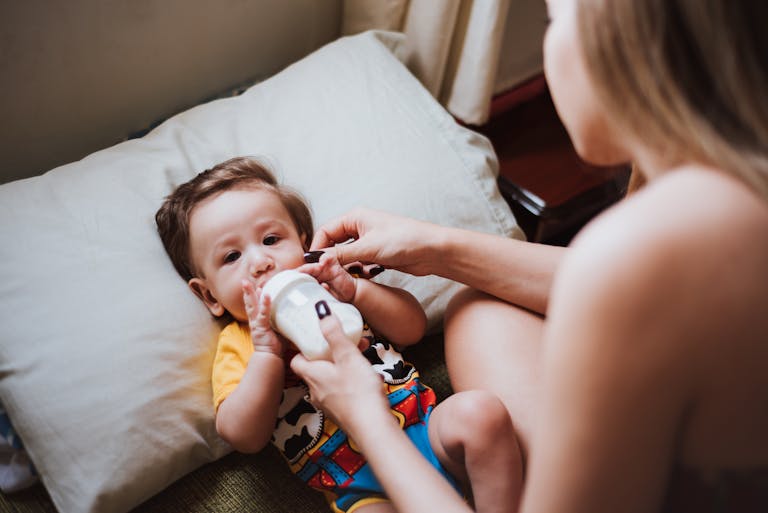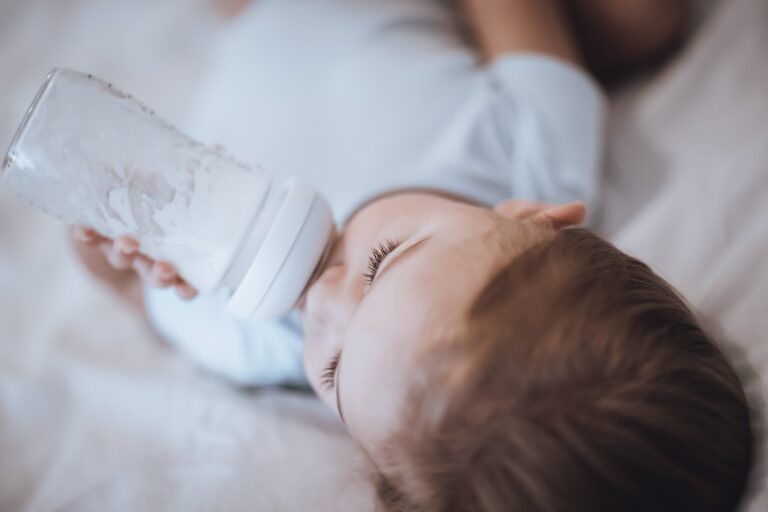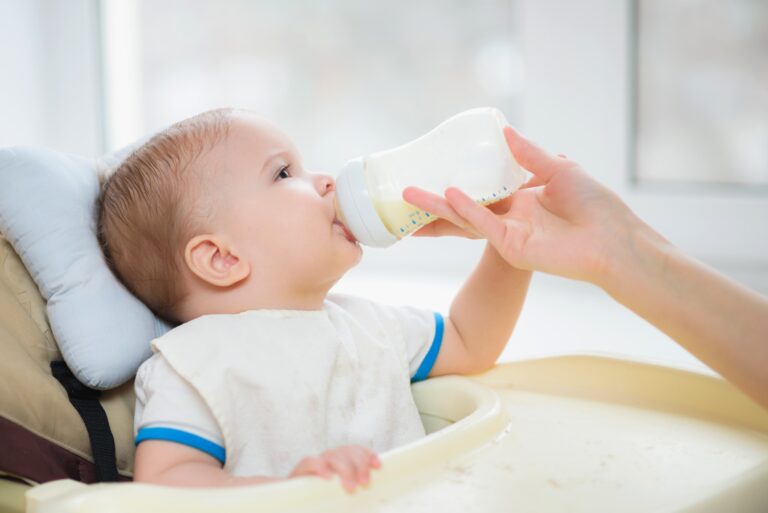What Happens When You Feed a Baby Old Formula? Quick Guide for Parents
When it comes to feeding your baby, providing them with safe and nutritious formula is of utmost importance. As a parent, you always want to ensure that your little one’s food is fresh and free from any potential risks.
But what happens if you accidentally feed your baby old formula? Is it safe? In this blog, we will explore the consequences of feeding a baby expired formula and the potential health risks associated with it.
We will also discuss the importance of heeding expiration dates, how to locate and interpret expiration dates on formula packaging, the risks of using old baby formula, and how to identify spoiled formula.
Additionally, we will provide tips on proper storage practices for baby formula and what to do if you’ve accidentally fed your baby old formula. Let’s dive in and learn more about the potential effects of feeding a baby old formula.
Key Highlights
- Baby formula should not be fed to a baby after its expiration date as it can pose potential health risks.
- Expired formula may contain harmful bacteria that can cause food poisoning in babies.
- Feeding a baby old formula can lead to poor appetite, stomach cramps, diarrhea, and vomiting.
- Spoiled formula can affect a baby’s digestive system, causing discomfort and digestive issues.
- It is important to properly store and handle baby formula to prevent spoilage and ensure its freshness.
- If you accidentally feed your baby old formula, take immediate steps and consult a pediatrician if necessary.
Importance of Heeding Expiration Dates
Heeding expiration dates is crucial when it comes to ensuring the safety and quality of baby formula. The expiration date indicates the date until which the formula is guaranteed to be fresh and safe for consumption. Using expired formula can pose potential health risks for your baby. The American Academy of Pediatrics (AAP) recommends following expiration dates and not using formula past its expiration date.
Expired formula may contain harmful bacteria that can lead to food poisoning in babies. Infants have developing immune systems, making them more susceptible to the effects of harmful bacteria. Consuming expired formula can cause a range of health issues, including poor appetite, stomach cramps, diarrhea, and vomiting.
To ensure the safety of your baby, always check the expiration date on the formula packaging before feeding. It’s best to err on the side of caution and discard any formula that is past its expiration date. By heeding expiration dates, you can protect your baby from potential health risks and ensure that they receive the best possible nutrition.
How to Locate and Interpret Expiration Dates on Formula Packaging
Locating and interpreting expiration dates on formula packaging is essential for ensuring the freshness and safety of the formula. The expiration date is typically printed on the bottom or side of the formula container. It is important to check the expiration date before opening the container to ensure that the formula is still within its shelf life.
When interpreting the expiration date, it is important to note that different formula brands may use different date formats. Some brands may use the day-month-year format, while others may use the month-day-year format. Pay close attention to the order of the numbers to accurately determine the expiration date.
For unopened baby formula, the expiration date indicates the date until which the formula can be safely consumed. It is important to use the formula before the expiration date to ensure its freshness and nutritional quality. Using expired formula can potentially result in a loss of nutrients and an increased risk of harmful bacteria.
Always check the expiration date on the formula container and discard any formula that is past its expiration date to ensure the safety of your baby.
The Risks of Using Old Baby Formula
Using old baby formula, especially if it is expired, can pose several risks to your baby’s health. The formula may contain harmful bacteria that can cause food poisoning and other gastrointestinal issues.
Feeding your baby old formula can lead to poor appetite, stomach cramps, diarrhea, and vomiting. Additionally, spoiled formula can affect your baby’s digestive system, causing discomfort and digestive issues.
It is important to be aware of the risks associated with using old baby formula and take necessary precautions to ensure your baby’s safety.
Potential Health Risks for Babies
Feeding a baby old formula can expose them to potential health risks. Expired formula may contain harmful bacteria that can cause food poisoning in babies. Babies have developing immune systems, making them more susceptible to the effects of harmful bacteria.
Consuming expired formula can result in a range of health issues for babies. These include poor appetite, stomach cramps, diarrhea, and vomiting. The presence of harmful bacteria in old formula can lead to gastrointestinal problems and discomfort for your baby.
To ensure the well-being of your little one, it is crucial to always check the expiration date on the formula packaging and use formula that is within its shelf life. By doing so, you can minimize the risk of exposing your baby to harmful bacteria and promote their overall health and well-being.
How Spoiled Formula Affects a Baby’s Digestive System
Spoiled formula can have negative effects on a baby’s digestive system. When formula becomes spoiled, it can contain harmful bacteria that can disrupt the balance of the digestive system.
Consuming spoiled formula can lead to digestive issues such as diarrhea and vomiting. The presence of harmful bacteria in the formula can cause irritation and inflammation in the digestive tract, resulting in these symptoms.
It is important to be proactive in identifying and discarding spoiled formula to prevent these digestive issues. By ensuring that your baby’s formula is fresh and free from spoilage, you can help maintain a healthy digestive system for your little one.
Identifying Spoiled Baby Formula
Identifying spoiled baby formula is crucial for ensuring the safety and well-being of your baby. There are visual and olfactory signs that can indicate spoilage in formula.
Visual signs of spoiled formula include changes in color and consistency. If the formula appears lumpy, discolored, or has an unusual texture, it may be spoiled and should be discarded.
Olfactory signs of spoilage include an unusual or foul smell. If the formula has a strong, unpleasant odor, it is a sign that it may be spoiled and should not be fed to your baby.
It is important to carefully inspect the formula for any visual or olfactory signs of spoilage before feeding it to your baby. If in doubt, it is best to discard the formula and prepare a fresh batch to ensure your baby’s safety.
Visual and Olfactory Signs of Spoilage
There are visual and olfactory signs that can indicate spoilage in baby formula. Visual signs include changes in color, consistency, and texture. If the formula appears discolored, lumpy, or has an unusual texture, it may be spoiled and should not be fed to your baby.
Olfactory signs of spoilage include an unusual or foul smell. If the formula has a strong, unpleasant odor, it is a sign that it may be spoiled and should be discarded.
It is important to carefully inspect the formula for any visual or olfactory signs of spoilage before feeding it to your baby. If you notice any of these signs, it is best to err on the side of caution and prepare a fresh batch of formula to ensure your baby’s safety.
Changes in Texture and Consistency to Watch For
Changes in texture and consistency can be indicators of spoiled baby formula. If the formula appears lumpy, clumpy, or has an unusual consistency, it may be spoiled and should not be fed to your baby.
Spoiled formula may also have a different texture than fresh formula. It may appear grainy or have a slimy texture, indicating that it is no longer safe for consumption.
It is important to carefully observe the texture and consistency of the formula before feeding it to your baby. If you notice any unusual changes, it is best to discard the formula and prepare a fresh batch to ensure your baby’s safety.
Proper Storage Practices for Baby Formula
Proper storage practices are essential for maintaining the freshness and safety of baby formula. Here are some guidelines to follow:
- Store unopened baby formula in a cool, dry place. Avoid exposing the formula to direct sunlight or extreme temperatures, as this can affect its quality.
- Once opened, powdered formula should be stored in a cool, dry place and used within one month. Be sure to tightly seal the container after each use to prevent moisture and contamination.
- Liquid formula and ready-to-feed formula should be refrigerated after opening. Follow the specific instructions on the packaging for storage guidelines. Generally, these formulas can be stored in the refrigerator for up to 48 hours if your baby hasn’t drank from them.
- Avoid freezing baby formula, as it can cause the formula’s components to separate and affect its quality.
By following proper storage practices, you can ensure that your baby’s formula remains fresh and safe for consumption. This will help protect your little one from potential health risks and provide them with the best possible nutrition.
Tips for Storing Opened and Unopened Formula
Proper storage of both opened and unopened baby formula is essential for maintaining its freshness and safety. Here are some tips to help you store formula correctly:
- Unopened baby formula should be stored in a cool, dry place. Avoid exposing it to sunlight or extreme temperatures.
- Once opened, powdered formula should be stored in a cool, dry place and used within one month. Be sure to tightly seal the container after each use to prevent moisture and contamination.
- If you have leftover formula that your baby hasn’t consumed, it should be discarded within one hour of feeding to prevent the growth of harmful bacteria.
- Always check the expiration date on the formula container and discard any formula that is past its expiration date.
By following these tips, you can ensure that your baby’s formula remains fresh and safe for consumption. Proper storage practices are crucial for maintaining the quality and nutritional value of the formula.
Best Practices for Preparing Formula to Avoid Spoilage
Proper preparation of baby formula is essential for avoiding spoilage and ensuring your baby’s safety. Here are some best practices to follow:
- Always wash your hands thoroughly before preparing formula to prevent the transfer of bacteria.
- Use clean, sanitized bottles and utensils for preparing and feeding formula.
- Follow the instructions on the formula packaging for the correct ratio of formula to water.
- Use warm water to prepare the formula, as hot water can destroy the nutrients in the formula.
- Feed the prepared formula to your baby immediately after preparation. Avoid leaving formula sitting out at room temperature for an extended period.
By following these best practices, you can minimize the risk of spoilage and ensure that your baby’s formula is safe and nutritious. Proper preparation and handling of formula are essential for your baby’s health and well-being.
What to Do If You’ve Accidentally Fed Your Baby Old Formula
If you’ve accidentally fed your baby old formula, don’t panic. Take the following immediate steps:
- Remove the bottle from your baby’s mouth and discard any remaining formula.
- Check for any signs of discomfort or illness in your baby. Monitor them closely for any changes in behavior or physical symptoms.
- If you notice any signs of illness or if you have any concerns, contact your pediatrician for further guidance. They can provide advice on how to proceed and may recommend monitoring your baby’s symptoms.
- Learn from the experience and be more cautious in the future. Always check the expiration date on the formula packaging before feeding your baby.
While accidental feeding of old formula may cause some temporary discomfort, it is unlikely to have any long-term effects on your baby’s health. By taking immediate steps and seeking guidance from your pediatrician if needed, you can ensure your baby’s well-being.
Immediate Steps to Take After Feeding
If you have accidentally fed your baby old formula, it is important to take immediate steps to ensure their well-being:
- Remove the bottle from your baby’s mouth and check for any remaining formula. Discard any leftover formula to prevent further consumption.
- Pay close attention to your baby’s behavior and monitor them for any signs of discomfort or illness. Look out for changes in behavior, fussiness, or any physical symptoms.
- If your baby shows signs of distress or if you have any concerns, contact your pediatrician for further guidance. They can provide specific instructions based on your baby’s individual circumstances.
- Be vigilant in the future and always check the expiration dates on formula packaging before feeding your baby.
By taking immediate steps and seeking guidance if necessary, you can ensure the safety and well-being of your baby after accidentally feeding them old formula.
When to Seek Medical Advice
If you have accidentally fed your baby old formula and are concerned about their well-being, it is important to seek medical advice. Contact your pediatrician if you notice any of the following signs of discomfort or illness in your baby:
- Persistent vomiting or diarrhea
- Excessive fussiness or irritability
- Changes in appetite or refusal to eat
- Abdominal swelling or discomfort
- Any other unusual or concerning symptoms
Your pediatrician can provide guidance and advice based on your baby’s specific symptoms and circumstances. They may recommend monitoring your baby closely or scheduling a visit to assess their condition further.
It is always better to err on the side of caution and seek medical advice if you have any concerns about your baby’s health after feeding them old formula. Your pediatrician is the best resource for providing appropriate guidance and ensuring your baby’s well-being.
Preventing Future Incidents
Preventing future incidents of feeding your baby old formula is essential for their safety and well-being. Here are some tips to help you avoid such incidents in the future:
- Always check the expiration date on formula packaging before feeding your baby. Make it a habit to verify the expiration date each time you prepare a bottle.
- Ensure that your baby’s bottles and formula storage containers are organized and labeled. This will help you easily identify the expiration dates and prevent confusion.
- Follow proper storage practices for baby formula, including storing unopened formula in a cool, dry place and refrigerating opened formula.
- Be mindful of the amount of formula you prepare to minimize leftover formula that may need to be discarded.
- Consider using a formula dispenser or formula pitcher to prepare smaller, fresh batches of formula as needed.
- Stay informed about best practices for formula feeding and disease control. Regularly review guidelines and recommendations from reliable sources such as the American Academy of Pediatrics or your pediatrician.
By implementing these preventive measures, you can ensure that your baby always receives fresh and safe formula. Taking proactive steps to avoid feeding your baby old formula will help maintain their health and well-being.
Organizational Tips for Formula Storage
Proper organization of formula storage can help you keep track of expiration dates and prevent incidents of feeding your baby old formula. Here are some organizational tips to consider:
- Use a storage system that allows you to easily identify and rotate formula containers based on their expiration dates. This can include using stackable containers or labeling shelves with expiration dates.
- Keep a record of when you open each container of formula. Use a marker or label to write the date of opening on the container to help you keep track of its freshness.
- Regularly check your formula storage area for expired containers and discard them promptly.
- Consider arranging the formula containers based on their expiration dates, placing those with the closest expiration dates at the front for easy access.
By implementing these organizational tips, you can ensure that you always have fresh formula on hand and minimize the risk of feeding your baby old formula.
Creating a Safe Feeding Schedule
Creating a safe feeding schedule can help you avoid incidents of feeding your baby old formula. Here are some tips to consider:
- Keep track of the time and date of each feeding. This will help you monitor when the last feeding occurred and prevent confusion about the freshness of the formula.
- Follow the recommended guidelines for the type of formula you are using. Different types of formula have different storage and shelf life requirements.
- Prepare formula in smaller quantities as needed to minimize the amount of leftover formula that may need to be discarded.
- Avoid leaving prepared formula sitting out at room temperature for an extended period. Feed your baby promptly after preparation or refrigerate the formula according to the guidelines for the specific type of formula.
By creating a safe feeding schedule and following the guidelines for formula storage and preparation, you can ensure that your baby always receives fresh and safe formula.
Frequently Asked Questions
How long is formula good for once prepared?
Once prepared, formula is good for a limited time. At room temperature, formula should be used within 2 hours. If refrigerated, it can be stored for up to 48 hours. However, it is always best to follow the specific instructions on the formula packaging to ensure safety and freshness.
Can moving formula between different temperatures affect its freshness?
Moving formula between different temperatures can affect its freshness and safety. Temperature changes can promote the growth of bacteria and cause spoilage.
It is important to follow the specific storage guidelines for different types of formula, such as powdered formula, liquid formula, and ready-to-feed formula, to ensure their quality and prevent spoilage.
Is it safe to use formula past its expiration date if it looks and smells fine?
No, it is not safe to use formula past its expiration date, even if it looks and smells fine. Expired formula may contain harmful bacteria that cannot be detected by appearance or smell. Using expired formula can increase the risk of food poisoning and other health issues in babies.
What differences are there between storing powdered, liquid concentrate, and ready-to-feed formulas?
There are differences in storing powdered, liquid concentrate, and ready-to-feed formulas. Powdered formula should be stored in a cool, dry place, while liquid concentrate and ready-to-feed formulas need to be refrigerated after opening. These differences in storage requirements ensure the freshness and safety of each type of formula.
How can I tell if my baby is reacting badly to old or spoiled formula?
If your baby is reacting badly to old or spoiled formula, you may notice signs such as increased fussiness, vomiting, and diarrhea.
These symptoms can indicate that the formula has been compromised and is no longer safe for consumption. If you suspect that your baby is reacting poorly to the formula, consult your pediatrician for guidance.
Conclusion
It is crucial to take the expiration dates on baby formula seriously. Using old formula can pose health risks to infants, affecting their digestive systems.
Visual and olfactory signs of spoilage should not be ignored. Proper storage practices are essential to prevent spoilage.
If you have fed your baby old formula by mistake, take immediate action and seek medical advice if necessary.
Organizing formula storage and following a safe feeding schedule can prevent future incidents.
Remember, your baby’s health is a top priority, so always be vigilant about the freshness and safety of the formula you use.





